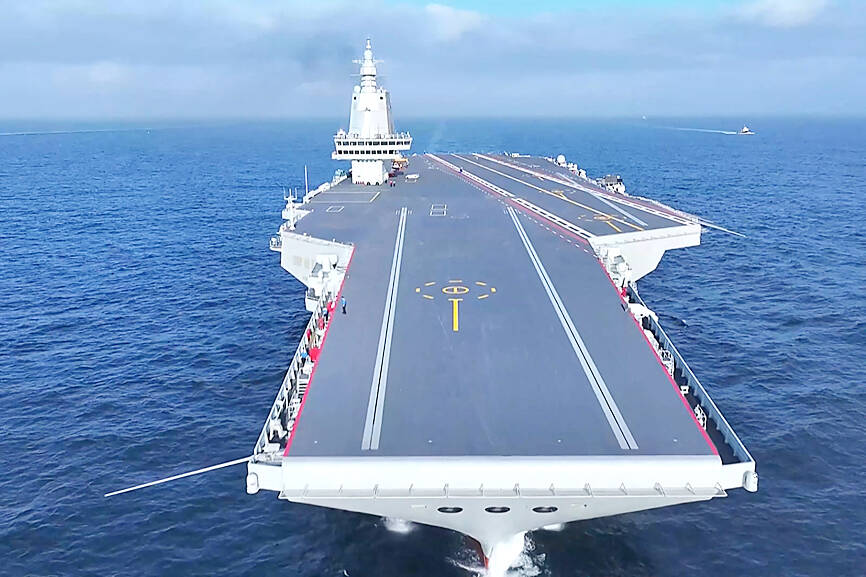China’s third aircraft carrier entered service this week, state media reported yesterday, marking a key milestone in Chinese President Xi Jinping’s (習近平) drive to modernize the military.
The Fujian joins China’s fleet as Beijing projects its maritime power against the US and others in the region, with flashpoints including territorial disputes in the South China Sea and persisting claims over Taiwan.
The latest aircraft carrier is equipped with an electromagnetic aircraft launch system (EMALS) — something that previously only the USS Gerald R. Ford possessed.

Photo: AFP / Chinese Ministry of National Defense
The advanced takeoff system allows the Chinese air force to deploy jets carrying larger payloads and more fuel.
Xinhua yesterday reported that Xi had “personally decided” that the Fujian would adopt EMALS.
Analysts say China lags behind the US, which has 11 aircraft carriers in service, in overall military prowess, but Beijing has directed billions of dollars into defense spending, a trend that has unnerved some governments in East Asia despite China insisting its aims are peaceful.
The navy in particular has seen a massive expansion as leaders seek to grow China’s reach in the Pacific and challenge a US-led alliance.
The new carrier’s official commissioning took place at a naval port in Hainan Province on Wednesday, Xinhua reported, describing the atmosphere as “grand and enthusiastic.”
“After the ceremony, Xi Jinping boarded the Fujian ... and learned about the development of the aircraft carrier system combat capabilities, and the construction and application of the electromagnetic catapult system,” it said.
Xi also went into the carrier’s control tower to learn about flight operations, Xinhua said, adding that he “solemnly signed the ship’s logbook.”
After conducting sea trials, the Fujian joins China’s other two aircraft carriers in active operation, the Liaoning and the Shandong.
The Soviet-built Liaoning is the oldest, commissioned in 2012, while the Shandong entered service in 2019.
China’s third carrier is “by many measures more capable than the Liaoning and the Shandong,” said Collin Koh (許瑞麟), an expert in regional naval affairs at Nanyang Technological University in Singapore.
“Overall, compared to the two preceding carriers which are ski-jump configured, the Fujian has greater combat persistence and striking power,” Koh said.
The Fujian had already been in the spotlight leading up to its formal commissioning.
Chinese defense officials in September said that the Fujian had sailed through the Taiwan Strait to carry out “scientific research trials and training missions” in the South China Sea.
The defense ministries in Taiwan and Japan at the time said that they had detected the Fujian’s movements, which brought it within approximately 200km of the disputed Diaoyutai Islands (釣魚台).

CROSS-STRAIT COLLABORATION: The new KMT chairwoman expressed interest in meeting the Chinese president from the start, but she’ll have to pay to get in Beijing allegedly agreed to let Chinese Nationalist Party (KMT) Chairwoman Cheng Li-wun (鄭麗文) meet with Chinese President Xi Jinping (習近平) around the Lunar New Year holiday next year on three conditions, including that the KMT block Taiwan’s arms purchases, a source said yesterday. Cheng has expressed interest in meeting Xi since she won the KMT’s chairmanship election in October. A source, speaking on condition of anonymity, said a consensus on a meeting was allegedly reached after two KMT vice chairmen visited China’s Taiwan Affairs Office Director Song Tao (宋濤) in China last month. Beijing allegedly gave the KMT three conditions it had to

STAYING ALERT: China this week deployed its largest maritime show of force to date in the region, prompting concern in Taipei and Tokyo, which Beijing has brushed off Deterring conflict over Taiwan is a priority, the White House said in its National Security Strategy published yesterday, which also called on Japan and South Korea to increase their defense spending to help protect the first island chain. Taiwan is strategically positioned between Northeast and Southeast Asia, and provides direct access to the second island chain, with one-third of global shipping passing through the South China Sea, the report said. Given the implications for the US economy, along with Taiwan’s dominance in semiconductors, “deterring a conflict over Taiwan, ideally by preserving military overmatch, is a priority,” it said. However, the strategy also reiterated

‘BALANCE OF POWER’: Hegseth said that the US did not want to ‘strangle’ China, but to ensure that none of Washington’s allies would be vulnerable to military aggression Washington has no intention of changing the “status quo” in the Taiwan Strait, US Secretary of Defense Pete Hegseth said on Saturday, adding that one of the US military’s main priorities is to deter China “through strength, not through confrontation.” Speaking at the annual Reagan National Defense Forum in Simi Valley, California, Hegseth outlined the US Department of Defense’s priorities under US President Donald Trump. “First, defending the US homeland and our hemisphere. Second, deterring China through strength, not confrontation. Third, increased burden sharing for us, allies and partners. And fourth, supercharging the US defense industrial base,” he said. US-China relations under

The Chien Feng IV (勁蜂, Mighty Hornet) loitering munition is on track to enter flight tests next month in connection with potential adoption by Taiwanese and US armed forces, a government source said yesterday. The kamikaze drone, which boasts a range of 1,000km, debuted at the Taipei Aerospace and Defense Technology Exhibition in September, the official said on condition of anonymity. The Chungshan Institute of Science and Technology and US-based Kratos Defense jointly developed the platform by leveraging the engine and airframe of the latter’s MQM-178 Firejet target drone, they said. The uncrewed aerial vehicle is designed to utilize an artificial intelligence computer